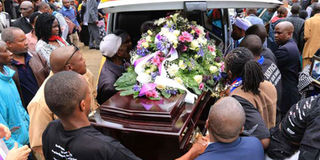Killing of lawyer, client and taxi driver echoes past executions

Pallbearers put a casket with the remains of lawyer Willie Kimani inside a hearse after a requiem mass at the Consalata Shrine in Nairobi on July 8, 2016. Mr Kimani's body was found in a river in Machakos on July 1, 2016. PHOTO | JEFF ANGOTE | NATION MEDIA GROUP
What you need to know:
- The ongoing vetting of serving police officers to determine their suitability has been the butt of jokes, especially with the mention of merry-go-round saving schemes that transact up to Sh100 million.
- Without asking what prosperous businesses officers run to earn them membership in such liquid merry-go-round chamas, disappearance, torture and murder will continue to provide the most stable source of income.
Willie Kimani, the lawyer tortured and killed by police alongside his client Josephat Mwenda and their taxi driver Joseph Muiruri, will be laid to rest on Saturday, so this column departs from its usual idiom to pay its respects.
Until now, the official line has been that the abduction, detention, torture and killing of the three was the work of a few bad apples in the police service. Yet, these disturbing vistas echo 24 executions by a squad of police officers recorded by a whistleblower on June 25, 2008.
The statement by Police Constable Bernard Kiriinya Ikunyua was given only four months before his own execution in broad daylight at a crowded Nairobi shopping mall.
His 16-page statement is a manual on how police torture, mutilate, extort and finally kill people. The details of how Kimani, Mwenda and Muiruri met their end could have been lifted from the statement nearly 10 years earlier.
It is a chilling tale of fruitcake officers, who routinely gouge out eyes, bludgeon skulls, tie up people, extort their families out of thousands of shillings as ransom before killing them. These psychopathic killers then meet at police canteens to eat roast meat and receive rewards that range from Sh2,000 to Sh15,000, as well as the promise of promotion.
Excerpts from the statement are bloodcurdling: “One suspect was strangled by use of a rope. They also used pangas and rungus to maim and disable him. After he succumbed to death, his body which had a rope on the neck, was tied to his vehicle and dragged for 100 metres.”
Mungiki sect leader Kimani Ruo was abducted from outside the High Court in Nairobi, taken to Ngong Forest, tortured and then transferred to Thika Road, where he was killed. Mungiki leader Maina Njenga’s wife Virginia Nyakio was abducted, robbed of the Sh5 million she had just withdrawn from the bank; cut on the head, clubbed to death in Ngong Forest and her body driven to Emali before being returned to Nairobi and later dumped in Gakoe, Gatundu, with a bottle inserted in her private parts.
The 14 officers involved in Ms Nyakio’s murder were promoted – two became sergeants and 12 were awarded the rank of corporal.
A tailor who tipped off a police corporal that some robbers were planning to hide firearms in his shop in Nairobi’s River Road was arrested, tortured and shot dead in City Park.
Many people were killed using ropes, axes and clubs before their bodies were dumped in rivers across the country to conceal police involvement.
Up to now, Mr Ikunyua’s statement, which names at least 14 executioner police officers and alleges details of how various highly placed individuals were disappeared, tortured and killed, remains uninvestigated. The police have been living in denial, all the time pretending to be undertaking reforms.
If these are the actions of a few rotten apples, the question must be asked if there are any good ones left.
The ongoing vetting of serving police officers to determine their suitability has been the butt of jokes, especially with the mention of merry-go-round saving schemes that transact up to Sh100 million. Without asking what prosperous businesses officers run to earn them membership in such liquid merry-go-round chamas, disappearance, torture and murder will continue to provide the most stable source of income.
The mobile money transfers are likely to be the smoking gun in the ongoing inquiry, as well as the entry point into how people not as prominent or noticeable as lawyer Kimani were disappeared, tortured and killed before their bodies were discarded in Msambweni, Sabaki, Ol Donyo Sabuk and Sagana rivers.





